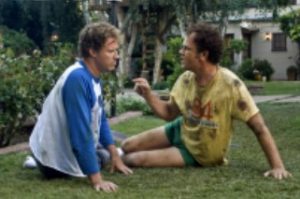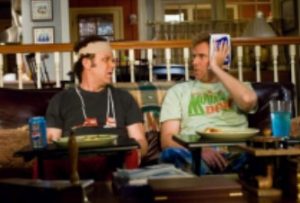49 Step Brothers (2008)
A Critical Analysis of Step Brothers through the lens of Difference, Power, and Oppression
By Garrett Merchant
In reviewing Step Brothers (2008), Roger Ebert wrote, “Sometimes I think I am living in a nightmare. All about me, standards are collapsing, manners are evaporating, people show no respect for themselves,” and rated it a lowly one and a half stars out of four. A critical scene in this film is an interview montage in which Dale and Brennan, our double protagonists, obliterate their potential hiring through interview after interview with complete disregard for the possible consequences. They reject society’s expectations of moving out and starting their own lives and resent the prompting and urging of their caretakers to do so. Their juvenile antics, such as building bunk beds and “doing karate” in the garage, lead to more drastic attempts to hold fast to their childhood and prevent the impending transition into adulthood. The literary design and comedic elements in Step Brothers are only the first layer of a profoundly complex film when analyzed from the perspective of difference, power, and oppression. In Step Brothers, the exaggerated immaturity and privilege of Dale and Brennan serve as a satirical exploration of masculinity and upper-class advantages, highlighting how their economic advantage shields them from consequences, enabling their rejection of societal expectations and critiquing how patriarchal norms can foster entitlement, prolonged adolescence, and an aversion to responsibility in men.

Step Brothers follows the lives of two 40-something white male children of separate single parents who fall in love and move in together, thus bringing together the two men who have seemingly both “failed to launch” for one reason or another. The movie’s cast is overwhelmingly white, male, and able-bodied, presenting a skewed and too often represented perspective from shot to shot throughout the film.
The film also commodifies a man who is blind as a repeating comedic element, misrepresenting the character and his guide dog, which the filmmakers portray as uncontrollable and dangerous. As Benshoff and Griffin, authors of America on Film: Representing Race, Class, Gender, and Sexuality at the Movies, explain, “If…American culture has perceived that masculinity was in crisis whenever the nation was in crisis, then the attacks on Sept. 11, 2001 threatened not only the United States but also American manhood.” Within the context of a crisis of masculinity, this film fits the mold of a cadre of satirical cinema, many of which were produced, written, and directed by Judd Apatow. Each of these films, which came to be dubbed “bromances,” featured two adult male friends whose friendship somehow prevented the “proper” transition into adulthood as expected by society (Benshoff and Griffin 294). Moreover, this film may have resonated even more with audiences given the economic crisis of 2008 and the renegotiation of masculinity once again with the underlying threat of joblessness and financial uncertainty.

John C. Reilly and Will Ferrell find common ground. yardbarker.com (source)
This “bromance” struggles to address the crisis of masculinity absurdly through the audience’s expectations of business culture. The film highlights key differences between Dale and Brennan’s life experiences and those of others with less economically protected and privileged status. A preferred reading of the text suggests that our protagonists have little to no comprehension of business practices, as seen in the dinner scene in which Dale and Brennan propose their failed business venture, “Prestige Worldwide.” Their proposal showcases their unorthodox and comical presentation skills, unethical use of props such as a yacht that does not belong to them, and unpolished, naive vision of business practice. The scene assumes the audience’s understanding of “standard” business practice and behavior for entrepreneurs in a proposal, which may also be understood as a cultural difference expected to be intuited by an audience, which would thereby assume the audience is predominantly white and male, able to laugh due to their “business culture” proximity. Colin R. Tate, professor of film at Texas Christian University, shares that this business culture satirized by Step Brothers is “A hyper-masculinized space, where the businessmen literally threaten each other with violence (12)” and “Derek is the main source of this critique, as his boorish behavior includes browbeating his wife and influencing his children to do much of the same to their mother (12).” This invites a negotiated reading of the difference in gender expression between Dale (coded as masculine, drums, engaging in sexual intercourse) and Brennan (coded as feminine, soft spoken unless pushed to break, “voice of an angel,” sensitive.) Derek, Brennan’s younger brother, belittles his older brother, embodying the toxic, masculine business culture (preferred reading) and emphasizing how much money he makes and his physical form. Brennan and Dale represent a different approach to masculinity in general, both rejecting the “overdetermined bravado of business culture, but…also question[ing] what it is to be a man in present-day America (Tate 2).” Interestingly, this examination of what it is to be a man is presented within a male-dominated cast and an almost exclusively all-white cast. This limits the ability for serious consideration of masculinity to some extent because masculinity is not exclusive to white men. The film is limited in its exploration without proper representation of both sexes, which do not simply serve to complement the men as they do in this film, as well as different ethnicities’ identities of masculinity. While this may not have been the intention of the filmmakers, this oversight highlights the predominantly white, patriarchal casting practices of Hollywood in the late 2000s.
Similar to the differences expressed in the preferred reading of Step Brothers, there is a clear display of power on the part of the dual protagonists in the film’s diegetic and non-diegetic elements. Power is most on display in the interview montage in the film’s second act. Low-angle shots create a larger-than-life appearance of these two characters as they sit on a couch waiting to be interviewed. Will Ferrell and John C. Reilly are physically large men at 6’3” and 6’2”, respectively. The casting of imposing figures could be read as adding to the comic element of the “man-children.” However, a more subtle reading would include the passive power displayed by masculinity writ large by their physical stature as Dale and Brennan tower over other characters throughout the film. The power of our main characters is shown more directly (preferred reading) through their economic status as they mock the interview process, wearing tuxedos to job interviews and rejecting proper interview etiquette with complete disregard for the consequences. Similar to these diegetic elements, such as comically small furniture and inappropriate over-dressed interview attire (which could also be read as oppression due to economic privilege), non-diegetic elements, such as hip-hop music as background to their bullish parade through the office space as they push people over and knock papers to the ground, suggests an inherent power imbalance between the protagonists and their setting.
Power can quickly become oppression within the film’s preferred reading and beyond that into a negotiated reading of gender roles as “what it means to be a man in present-day America (Tate 2)” is explored. In a preferred reading, oppression can be viewed through the lens of Dale and Brennan’s struggle to be accepted as the creative, expressive individuals they are. Colin Tate contends that Dale and Brennan are at odds with the patriarchal, capitalistic expectations of men and praises the film for perpetuating “…male protagonists whose chief qualities are sweetness, remaining true to their core personality traits and love (13)…” Underneath the struggles of the white male protagonists, there is inherent oppression in the use of female characters as set pieces or objects of scorn. The perpetuation of the “difficult woman” in the business world is evident in the interview montage sequence when Brennan repeatedly tells the woman interviewing him to “shut her mouth,” after which Dale reiterates this, and the dialogue is repeated ad nauseam. This scene is crucial to the oppressive manner in which this film addresses women and thus promotes the oppression and subjugation of women. While the interviewer is meant to be in the position of power, this scene communicates that Dale and Brennan, being white and male, inherently retain more power than she does. Inevitably, the interviewer becomes angry with the inappropriate and belligerent behavior exhibited by Dale and Brennan. At this point, she shouts at them to “get out,” thus transforming into the “difficult woman.” Women in a professional setting experience a double-bind, wherein they are expected to assert authority without “being too aggressive,” yet when they are disrespected or belittled, societal norms expect them to refrain from responding forcefully, which perpetuates cycles of disempowerment among women in the workplace.

as Nancy and Dr. Robert Doback, Brennan and Dale’s step-parents. aceshowbiz.com (source)
This text can be read and decoded in many ways. Roger Ebert, renowned American TV, and film critic, was appalled at the unnecessary violence and foul language used in this film and went so far as to say, “In its own tiny way, it lowers the civility of our civilization.” I believe Ebert makes excellent points about the decline of standards while missing the point of some elements of satire, without which, would leave a severely unfunny, depressing film, an artifact-commentary on the status of society, which would depress me too. I admit that many scenes in this film are unacceptable and difficult to watch without the context and understanding of satire, and even then, this film is not an excellent piece of cinema, in my opinion. I find the negotiated reading and, at times, oppositional reading of this text far more fascinating (and alarming) than the preferred reading. The encoded message is understandable and accessible, but this film’s anachronistic element intrigues me most. As American society negotiated masculinity, femininity, and gender as a spectrum, this was a dark time for cinema. Though not nearly as dark as earlier in Hollywood history, the attempts at representation are non-existent, and therefore, the satirical elements fall short of their intended goal. I admire those such as Colin Tate, who was able to decode growth and progress from this film relative to similar genres from the past, but I do not see this film as a landmark of progress.
Despite being a film of little significance or impact culture-wise, this film had a significant impact on me when I first saw it in 2008. I was seventeen years old when this film was released and came from an economic background that might be the exact circumstances satirized by Step Brothers. I also grew up observing and living a renegotiation of masculinity, moving from the 1980s action heroes to “Geek culture,” “helicopter parents,” and “various stages of ‘arrested development,’” as described by Benshoff and Griffin. Slacker culture said we did not have to go to college or be successful in the standard ways our predecessors did, and the dot com era reassured us that anyone could get rich through all this new technology at any moment. That did not happen, and many people, though still resistant to working hard for their money as most had for time immemorial, found they might have to do that. I was about to graduate from high school when this movie came out, and I resonated deeply, unironically, with the criticisms of business culture and societal expectations. I also live the white male advantage, experiencing the opportunities afforded to me therein, such as not necessarily needing to work to stay housed and fed, with an affluent family to support me as I explored. This, in turn, led to my prolonged adolescence and aversion to responsibility. I was delighted and entertained when I saw these elements of my own experience portrayed as absurdity. I chose this film because I once resonated with the preferred reading of the text, unaware of much of the satire and even less aware of negotiated and oppositional readings. I chose this film because I wanted to examine my childhood, adolescence, and privilege.
When I first read Roger Ebert’s review of one of my favorite films from my adolescence, I was offended on behalf of my teenage self. I have rarely laughed harder than I did watching this film when it was first released. As I moved through an analysis of Step Brothers, I was unsure I would find substance to analyze, sometimes believing I had made a mistake in my film choice. I think Roger was right. There is a time when growing is painful, and negotiating that next step is messy. I believe this film, while satirizing some elements of masculinity and highlighting legitimate concerns, has significant implications regarding the views of whose masculinity and concerns were valid, in what culture, and what ethnicity. I see myself in these two characters, resisting change, fear of responsibility, and protection from their economic status, enabling them never to grow up. I also see the oppression of others in decoding this text, which I have done through the lens of difference, power, and oppression. I see a film that I once found infinitely funny, and I remember a little boy who did not want to grow up to take responsibility for his white male privilege or look at the damage done when he ignored that privilege. This film chose me then; from somewhere within, I wanted to look deeper at how society and privilege had fostered entitlement, prolonged adolescence, and aversion to responsibility in me.
References
Benshoff, Harry M., and Sean Griffin. America on Film: Representing Race, Class, Gender, and Sexuality at the Movies. Third edition, Wiley Blackwell, 2021.
Ebert, Roger. “The Feel-Bad Comedy of the Year! Movie Review 2008 | Roger Ebert.” RogerEbert.Com, Ebert Digital LLC, 23 July 2008, https://www.rogerebert.com/reviews/step-brothers-2008.
Tait, R.Colin. “The Screwball Bromance: Regression, Bisexuality, and Reconfigured Masculinity in Step Brothers.” Journal of Men’s Studies, vol. 24, no. 1, Mar. 2016, pp. 60–77. EBSCOhost, https://doi.org/10.1177/1060826515624412

